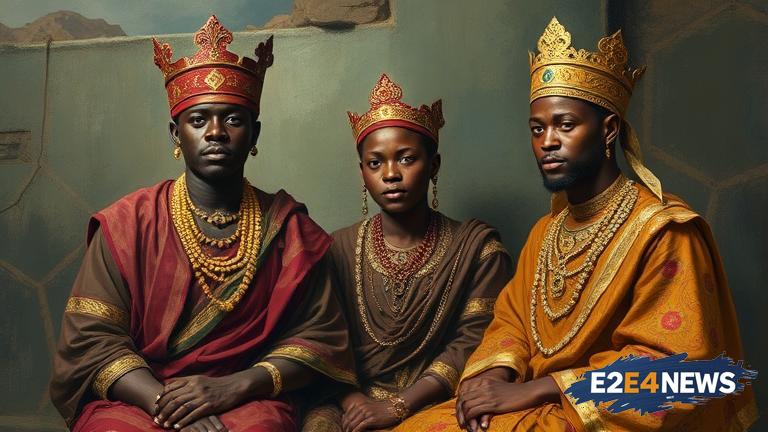The Yoruba people, an ethnic group from Southwestern Nigeria, have a rich cultural heritage that spans centuries. At the heart of this culture are the Yoruba princes, who play a significant role in the traditional monarchies of the region. These princes are not only born into royalty but are also expected to uphold the traditions and customs of their ancestors. However, with the advent of modernization and urbanization, the role of Yoruba princes has evolved, and they now face numerous challenges in balancing their traditional responsibilities with the demands of contemporary society. Despite these challenges, the Yoruba princes remain an integral part of their communities, serving as custodians of their cultural heritage and playing a vital role in the preservation of their traditions. The Yoruba monarchy is a complex system, with various kingdoms and empires, each with its own distinct customs and practices. The princes are expected to be well-versed in the history and traditions of their kingdom, as well as be skilled in the arts of warfare, diplomacy, and leadership. In addition to their traditional roles, many Yoruba princes are now pursuing modern education and careers, seeking to make a positive impact in their communities and beyond. Nevertheless, they still face numerous obstacles, including the pressure to conform to traditional expectations, while also navigating the complexities of modern life. The Yoruba princes are also expected to be fluent in their native language, Yoruba, as well as be knowledgeable about their cultural practices, such as the Ifa oracle and the Egungun festival. Furthermore, they are expected to be skilled in the traditional arts, such as music, dance, and woodcarving. The role of Yoruba princes in modern times is multifaceted, and they are increasingly taking on new responsibilities, such as promoting cultural exchange and understanding between different communities. They are also playing a vital role in the preservation of their cultural heritage, by documenting and promoting their traditions, customs, and history. Moreover, the Yoruba princes are working to address the social and economic challenges facing their communities, such as poverty, lack of access to education, and healthcare. In recent years, there has been a resurgence of interest in Yoruba culture, with many young people seeking to learn more about their heritage and traditions. The Yoruba princes are at the forefront of this movement, using social media and other platforms to promote their culture and connect with other communities around the world. However, despite the many positive developments, the Yoruba princes still face numerous challenges, including the threat of cultural erosion, as well as the pressure to conform to modern expectations. In conclusion, the Yoruba princes play a vital role in the preservation and promotion of their cultural heritage, and their contributions should not be underestimated. As they continue to navigate the complexities of modern life, it is essential that they remain true to their traditions and customs, while also embracing the opportunities and challenges of the modern world. The Yoruba princes are a testament to the enduring power of culture and tradition, and their stories serve as a reminder of the importance of preserving our cultural heritage for future generations. Ultimately, the Yoruba princes are a source of inspiration, and their dedication to their culture and traditions is a beacon of hope for communities around the world. The Yoruba people have a saying, ‘Ilé ni a ti npa,’ which translates to ‘Home is where the heart is.’ For the Yoruba princes, their home is not just a physical place, but a cultural and spiritual one, where they can connect with their ancestors and their heritage. As they continue to navigate the complexities of modern life, it is essential that they remain connected to their roots, and that they continue to promote and preserve their cultural heritage for generations to come.





